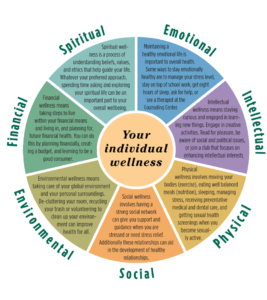What is wellness? Discover what wellness means, the multiple dimensions of wellness, and examples of how to increase your wellness.
What is Wellness?
The terms “health” and “wellness” are often used interchangeably. The World Health Organization (WHO) has defined health as, “a state of complete physical, mental and social well-being and not merely the absence of disease or infirmity.” Although wellness can be defined similarly, some suggest that wellness is more active and process-oriented whereas health is more of a state of being. For example, the national wellness institute defines wellness as, “an active process through which people become aware of, and make choices toward, a more successful existence.”
What Dose Wellness Mean
what people mean when they say wellness is slightly different. Within the wellness field, we tend to think of wellness as somewhere between physical health and mental well-being. Usually when people are referring to “health”, they mean physical health, and when people say “well-being”, they are referring to mental health. Wellness is a somewhat broader term that generally includes both physical health and mental well-being as well as other dimensions like spirituality.
These are Dimensions of Wellness

Although there are differing beliefs on the definition of wellness and the number of wellness dimensions, we’ll talk here about 8 dimensions.
Environmental Wellness
Environmental wellness means that we live in balance, connection, and synergy with our surroundings. This means that where we live is calm, safe, non-toxic, and supportive of our health and well-being. It’s important to remember that our environment contributes to our wellness, but we also have some control over our environment. To improve our environmental wellness, we might opt to get an air filter or water filter to lessen the impact pollution has on us.
Physical Wellness
Physical wellness usually includes diet, exercise, and sleep. Nutrition is perhaps one of the most talked about areas of wellness. Indeed, it’s important to learn about which foods to eat for greater wellness and which foods contribute to ill-health.
Exercise is another big topic. Exercise is not only good for physical wellness, it contributes to better emotional wellness as well. So try to get at least a bit of exercise every day.
Emotional Wellness
Emotional wellness (or emotional well-being) is what we cover the most on this website. It includes a range of emotional skills like positive thinking, resiliency, and using our strengths. By developing these life skills, we can better manage emotions, cope with stress, and live satisfying, meaningful lives.
Intellectual Wellness
Intellectual wellness is all about learning and growing. When we make an effort to be curious, creative, and think critically, we get to experience more things that can fuel wellness. For example, we could go to a gallery and be inspired by beautiful art. We can have conversations with people who are different than us and learn new things that might help us re-think our challenges and world view.
Spiritual Wellness
Our spiritual wellness comes from connection to something greater than ourselves. Our wellness could come from a connection to god, but spiritual wellness can also come from connection to the planet, other people, and ourselves. We can increase spiritual wellness with strategies like mindfulness and living our values. By making these efforts, our lives feel more purposeful and impactful.
Occupational Wellness
Occupational wellness can be found by contributing something meaningful to the world. (We can get this type of wellness from school or volunteering as well). When we feel purposeful about our work and are appreciated for a job well done, we feel more meaning. Even if we can’t throw caution to the wind and quit our jobs, we can grow our occupational wellness in small ways, for example by helping out a coworker, joining a project we’re interested in, or building new skills to move into a career that is more fulfilling.
Financial Wellness
Although money doesn’t exactly buy happiness, not having enough money can contribute to reduced health and happiness. That’s why it’s important to learn about money, create a budget, and use money strategically to enhance wellness. For example, research shows that spending money on experiences and other people makes us happier than buying things for ourselves. By understanding the role money has in wellness, we can make decisions that improve our lives.
Social Wellness
What to Do Now That You Know What Wellness Is

